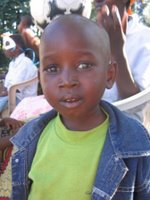
Every day we learn more little lessons about Rwandese culture. Tuesday’s lesson was that coffee and tea breaks in meetings are unheard of. So for our legal training workshop, every Wednesday and Thursday at 10am, we will be having…Fanta and cake. Yup, Fanta and cake. Apparently this is entirely normal.
#2: Any transaction that should be relatively simple, such as ordering food for an event, withdrawing money from the bank, or buying office supplies requires at least an hour and a half of heated discussion and back and forth negotiations, in three different languages.

#3: According to popular theory, people who drink Fanta Orange are virgins. There is some debate as to whether, if you take a girl on a date and she orders a Fanta Orange, she is implying that she will or will not sleep with you.

#4: When Rwandans enter a room they say hello to everyone there before doing anything else. The standard greeting is three cheek kisses and a handshake.
#5: Eating on the street (or while walking or talking or working) is considered very rude.
#6: Most Rwandans only eat two meals a day – breakfast and dinner, or breakfast and a big lunch, but no dinner. This does not fit well with my lifestyle of constant face-stuffing.
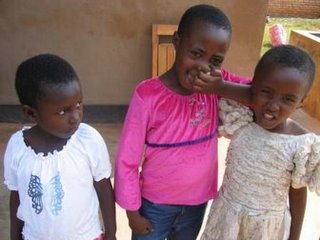
#7: Doing business over the phone is not so usual. Everything requires a meeting and face-to-face negotiations, even if all you want is for someone to forward you a PDF that you need.
#8: There is no such thing as right of way. It’s a vehicle and pedestrian free-for-all out there! (Also, it’s in your best interests, as a pedestrian, to always assume that drivers have no qualms about running you over, because they probably don’t.)
#9: Though street names and addresses do exist for the main (paved) roads, no one actually uses them. Directions are always given by the name of the neighborhood and/or landmarks, and often depend on where you’re coming from. So the Kiyovu house is usually “près de la maison du président,” the apartment is “Kimihururu, après Papyrus et Médecins Sans Frontières, le bâtiment blanc a la gauche” and the office is “Centre Ville, en face de le BCK.” (Although this doesn’t help much if your moto driver doesn’t speak French, which happens a lot.) God help you if you don’t learn your way around PDQ :)

#12: Grunting and wordless exclamations of “ehhhh” are acceptable (and common) contributions to a conversation.
Other day-to-day observations:
* Everyone here calls me “sister” – I love this.
* Little hole-in-the-wall office supply shops have sprung up everywhere (a market fed by the plethora of NGOs here) – if you’re looking for something one of them doesn’t have, they will send someone off to who knows where, running all over the neighborhood until they miraculously appear, 10 minutes later, with just what you were looking for.
* The local minibuses are very creatively decorated, with huge and sparkly stickers all over them. Some of my favorites: “Goldigger,” “Beyonce,” “Tuff Gong,” and “What if God Was One of Us?”
* Any given day you are likely to run into several guys walking the streets, holding a single pair of pants in front of them, or a different shoe on each finger, trying to sell them to passersby. I always wonder what they do when they sell that one piece of clothing – do they have a stash somewhere where they just grab another one to walk around with? And is this actually a lucrative business?

* Little kids are overly excited by the sight of white people (we are kind of translucent and funny-looking, so this is understandable). Cries of “muzungu, muzungu!” are common on our morning walk to the main road.
* Queuing is unheard of. Everything is accomplished here via mad rush.
* The little girls in party dresses look is in, as are brightly colored rubber shoes and the widely popular short tie.
* And lastly, it’s amazing how well-dressed a lot of the people here are, especially the men (though there are some interesting pattern-matching choices on their part). And how do they keep their shoes so freaking shiny?? Two minutes after leaving the house our feet and shoes are covered in about 5 inches of dust and dirt. Marianna and I are at a loss, but plan to investigate further. Will update when we discover the secret to perpetually clean footwear.
 Some addenda from roomie Jordan:
Some addenda from roomie Jordan:o
Backpacks are carried on your head; babies are carried on your back
o
One big print is good; two big prints is better
o
It’s not in any way inconsistent to schedule two meetings, in two entirely different locations, at exactly the same time. No one gets anywhere when they say they will anyway!
 Today we visited Nyabiheke refugee camp, one of the sites where Jess works. We got there a little after noon, stopped by the office to pick up some things and greet everyone, then headed into the main part of camp. Nyabiheke is one of the smaller camps, with just under 5,000 residents, mostly from the Congo. UNHCR (the United Nations High Commissioner for Refugees) is in charge of these camps, and I must say, is running quite an operation, along with the ARC (American Refugee Committee), whom Jessica works for. Of course, the conditions are quite basic, but it is clear that the staff cares very deeply about the refugees and that they are supporting them as best they can. The head nurse showed us around their medical facilities, including the wards for men, women, and children,
Today we visited Nyabiheke refugee camp, one of the sites where Jess works. We got there a little after noon, stopped by the office to pick up some things and greet everyone, then headed into the main part of camp. Nyabiheke is one of the smaller camps, with just under 5,000 residents, mostly from the Congo. UNHCR (the United Nations High Commissioner for Refugees) is in charge of these camps, and I must say, is running quite an operation, along with the ARC (American Refugee Committee), whom Jessica works for. Of course, the conditions are quite basic, but it is clear that the staff cares very deeply about the refugees and that they are supporting them as best they can. The head nurse showed us around their medical facilities, including the wards for men, women, and children,  as well as the maternity ward (where, Jess tells us, they found a huge snake lurking not long ago – not a place I would choose to give birth - if I had the choice). The men’s ward was empty; in the children’s ward was a young boy who had injured himself falling out of a tree, as well as a couple other kids with malaria. Everyone in the women’s ward
as well as the maternity ward (where, Jess tells us, they found a huge snake lurking not long ago – not a place I would choose to give birth - if I had the choice). The men’s ward was empty; in the children’s ward was a young boy who had injured himself falling out of a tree, as well as a couple other kids with malaria. Everyone in the women’s ward had either malaria or typhoid or both. (HIV prevalence in the camp is extremely low – well under 1% at last count – the main medical problem by far is malaria). The omnipresent UNHCR tarp that acts as floor, walls, and ceiling in buildings
had either malaria or typhoid or both. (HIV prevalence in the camp is extremely low – well under 1% at last count – the main medical problem by far is malaria). The omnipresent UNHCR tarp that acts as floor, walls, and ceiling in buildings .jpg) throughout the camp cast a greenish glow over everything, making our surroundings feel a little eerie yet somehow appropriate.
throughout the camp cast a greenish glow over everything, making our surroundings feel a little eerie yet somehow appropriate..0.jpg) who was struck by lightning while fleeing the Congo to join his mother and sisters in the camp and speeds around quite well on his crutches, as well as a woman who has miraculously survived to 105 years old, and Kevin, possibly the cutest baby alive (and who turns out to be, in fact, a girl).
who was struck by lightning while fleeing the Congo to join his mother and sisters in the camp and speeds around quite well on his crutches, as well as a woman who has miraculously survived to 105 years old, and Kevin, possibly the cutest baby alive (and who turns out to be, in fact, a girl).

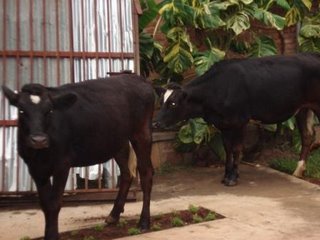

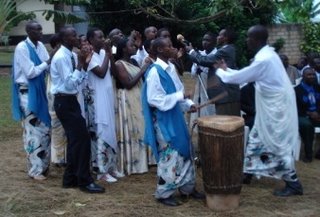
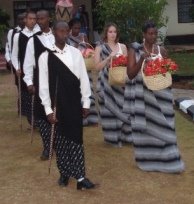




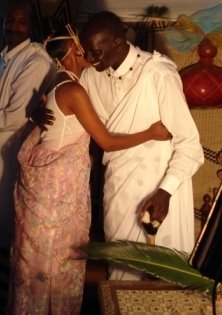


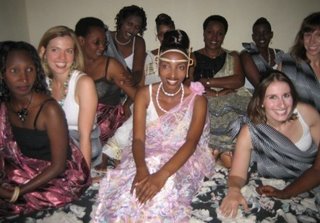







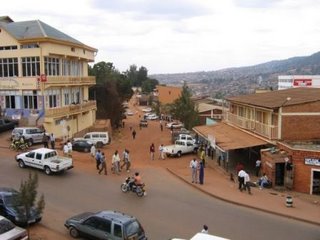











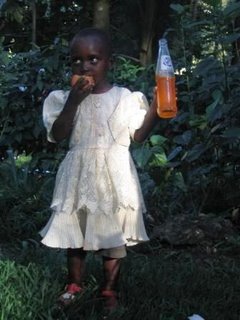
 Friday was the Day of the African Child, which we celebrated by throwing a huge party for the kids in our pediatric AIDS program and their families. Diafuka and Bertin found us a great venue, a restaurant near the airport called La Palisse that had a couple of beautiful gardens and a playground. We had face-painting, hat & mask-making, and lots of other games and art projects, plus some traditional dance & music performances. Word got
Friday was the Day of the African Child, which we celebrated by throwing a huge party for the kids in our pediatric AIDS program and their families. Diafuka and Bertin found us a great venue, a restaurant near the airport called La Palisse that had a couple of beautiful gardens and a playground. We had face-painting, hat & mask-making, and lots of other games and art projects, plus some traditional dance & music performances. Word got 